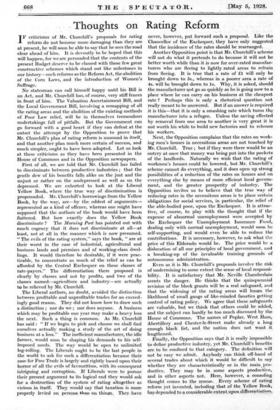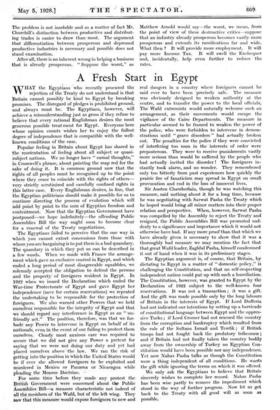Thoughts on Rating Reform
• . - IF criticisms of Mr. Churchill's proposals for rating reform do not become more damaging than they are at present, he will soon be able to say that he sees the road .clear ahead of him. It is devoutly to be hoped that this will happen, for we are persuaded that the contents of the present Budget deserve to be classed with those few great constructive schemes which stand out like milestones in our history—such reforms as the Reform Act, the abolition of the Corn Laws, and the introduction of Women's Suffrage.
No statesman can call himself happy until his Bill is an Act, and Mr.. Churchill has, of course, very stiff fences in front of him. The Valuation Ascertainment Bill, and the Local Government Bill, involving a remapping of all the rating areas and the abolition of the existing methods of Poor Law relief, will be in themselves tremendous undertakings full of pitfalls. But the Government can go forward with a good heart if they can defeat at the outset the attempt by the Opposition to prove that Mr. Churchill's plan of rating reform is unsound in itself, and that another plan much more certain of success, and much simpler, ought to have been adopted. Let us look at these criticisms as they have been presented in the House of Commons and in the Opposition newspapers. - First of all, we are told that Mr. Churchill has failed to discriminate between productive industries ; that the gentle dew of his benefits falls, alike on the just and the unjust or rather on the undepressed as well as on the depressed. We are exhorted to look at the Liberal Yellow Book, where the true way of discrimination is propounded. Mr. Churchill's borrowings from the Yellow Book, by the way, are—by the..oddest of arguments— represented as a kind of offence, whereas one might have supposed that the authors of the book would have been flattered. But how exactly does the Yellow Book discriminate ? The Morning Post has pointed out with much cogency that it does not discriminate at all—at least, not at all in the manner which is now presumed. " The evils of the rating system," says the book, " are at their worst in the case of industrial, agricultural and business lands and premises and of working-class dwel- lings. It would therefore be desirable, if it were prac- ticable, to concentrate as much of the relief as can be afforded by the Central Exchequer on these classes of rate-payers." The differentiation there proposed is clearly by classes and not by profits, and two of the classes named—agriculture and industry—are actually to be relieved by Mr. Churchill.
The Liberal authors, no doubt, avoided the distinction between profitable and unprofitable trades for an exceed- ingly good reason. They did not know how to draw such a distinction ; nor do we ; nor does anyone. A business which may be profitable one year may make a heavy loss the next. Such a thing is common. As Mr. Churchill has said : " If we begin to pick and choose we shall find ourselves actually making a study of the art of doing business at a loss." The inefficient manufacturer, the idle farmer, would soon be shaping his demands to his self- imposed needs. The way would be open to unlimited tog-rolling. The Liberals ought to be the last people in the world to ask for such a differentiation because their case for Free Trade is largely and rightly based upon their horror of all the evils of favouritism, with its consequent intriguing and corruption. If Liberals were to pursue their present argument to its logical end they would ask for a destruction of the. ,system of rating altogether as vicious in itself, They would say that taxation is more properly levied on persons than on thins. They .have. never, however, put forward such a proposal. Like the Chancellor of the Exchequer, they have only suggested that the incidence of the rates should be rearranged. Another Opposition point is that Mr. Churchill's scheme will not do what it pretends to do because it will not be better worth while than it is now for over-rated manufac- turers who are fleeing to lightly rated areas to refrain from fleeing. It is true that a rate of will only be brought down to 5s., whereas in a poorer area a rate of 4s. will be brought down to is., Why, it is asked, should the manufacturer not go as quickly as he is going now to a place where he can carry on his business at the cheapest rate ? Perhaps this is only a rhetorical question not really meant to be answered. But if an answer is required it is this—that it is only a smashing rate which turns the manufacturer into a refugee. Unless the saving effected by removal from one area to another is very great it is not worth his, while to build new factories and to rehouse his workers.
Next, the Opposition complains that the rates on work- ing men's houses in necessitous areas are not touched by Mr. Churchill. True ; but if they were there would be an outcry at once that money was being put into the pockets of the landlords. Naturally we wish that the rating of workmen's houses could be lowered, but Mr. Churchill's scheme cannot do everything, and it does open up strong possibilities of a reduction of the rates on holises and on everything else by means of more efficient local govern.. ment, and the greater prosperity of industry. The Opposition invites 'us to believe that the true way of reducing rates in the necessitous areas is to place certain obligations for social services, in particular, the relief of the able-bodied poor, upon the Exchequer. It is attrac- tive, of course, to play with the thought that if the expense of abnormal unemployment were accepted by the Exchequer the Unemployment Insurance Fund, dealing only with normal unemployment, would soon be self-supporting, and would even be able to reduce the contributions. It is necessary, however, to ask what the price of this Eldorado would be. The price would be a dislocation of all our principles of local government, and a_ breaking-up of the invaluable training grounds of autonomous administration.
Even as it is Mr. Churchill's proposals involve the risk of undermining to some extent the sense of local responsi- bility.. It is satisfactory that Mr. Neville Chamberlain scents the danger. He thinks that the quinquennial revision of the block grants will be a real safeguard, and that the widening of the rating areas will lessen the likelihood of small gangs of like-minded fanatics getting control of rating policy. We agree that these safeguards are valuable, but we think that others could be added, and the subject can hardly be too much discussed by the House of Commons. The names of Poplar, West Ham, Abertillery and Chester-le-Street make already a long enough black list, and the nation does not want it lengthened.
Finally, the Opposition says that it is really impossible to define productive industry, yet Mr. Churchill's benefits are to be confined to that category. The definition will not be easy we admit. Anybody can think off-hand of several trades about which it would be difficult to say whether they are characteristically or in the main. pro- ductive. They may be in some aspects productive, and_ in other aspects not. Here, however, a consoling thought comes to the rescue. _ Every scheme of rating reform yet invented, including that of the Yellow Book, ha,sdepencled to aconsiderahle extent upon differentiation,: The problem is not insoluble and, as a matter of fact Mr. Churchill's distinction between productive and distribut- ing trades is easier to draw than most. The argument that differentiation between prosperous and depressed productive industries is necessary and possible does not stand examination.
After all, there is no inherent wrong in helping a business that is already prosperous. " Suppose the worst," as Matthew Arnold would say—the worst, we mean, from the point of view of these destructive critics—suppose that an industry already prosperous becomes vastly more prosperous and extends its ramifications far and wide. What then ? It will provide more employment. It will pay more Income Tax. It will swell the Exchequer and, incidentally, help even further to reduce the rates.









































 Previous page
Previous page